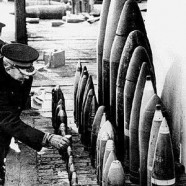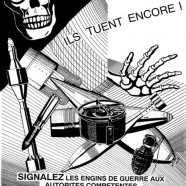Inventory of War Remains of Atlantique-Manche Regions from January 1, 2008 to December 31
Inventory of War Remains
Atlantique-Manche Regions
January 1, 2008 – December 31, 2013
Special D-Day Commemoration
June 2014
Sommaire
Introduction
Weapons in the inventory
Sanitary and environmental risk
Inventory of War Remains from January 1, 2008 to December 31, 2013 with maps:
How Does France Manage Old Chemical Weapons?
Update
October 14, 2013 : a ministerial decree permits ASTRIUM to build SECOIA at Mailly-le-Camp.
—————————–
For 13 years, Robin des Bois has been working on the war waste issue including chemical weapons. Considering the current state of development it seems useful to review the doctrine and the actual practice of France in relation to the international Convention on the Prohibition of the Development, Production, Stockpiling and Use of Chemical Weapons and on their Destruction known as the Chemical Weapons Convention. The majority of chemical weapons to be destroyed on French territory were made with phosgene and chloropicrin, mustard gas and chlorobenzene, zinc tetrachloride, arsenic and cyanide.
Waiting for the bomb squad – War Remains Inventory from January 1, 2008 to December 31, 2011
Contents
Introduction
The unsettling truths – The battlefields of northern and eastern France – Old weapons kill – Old weapons pollute – Old weapons harm flora and fauna – Chemical weapons
War Remains Inventory from January 1, 2008 to December 31, 2011 with maps:
Franche-Comté Region
Alsace Region
Lorraine Region
Champagne-Ardenne Region
Ile-de-France Region
Picardie Region
Nord – Pas-de-Calais Region
Summary map
Sources
Introduction
War remnants do not have a course. Old weapons kill, pollute, and are the enemies of biodiversity. Following their previous research, Robin des Bois has published a new inventory of weapons discovered in the 7 regions in the north and east of France, casualties of the wars of 1870, 1941-18, and 1939-45.










